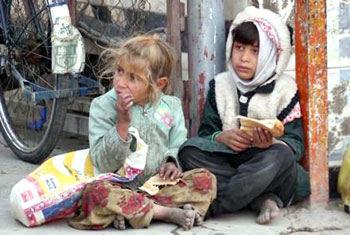Following global concern about the poor economic situation in Afghanistan, Save the Children in a recent report said that Afghanistan is facing its worst food crisis, with 5 million children on the brink of starvation.
According to the organization, about two in three children in Afghanistan – or 12 million – whose families depend on farming to survive, are struggling to get enough to eat daily due to the country’s worst drought in decades and are facing forecasts of below-average rains this wet season.
“Humanitarian aid can alleviate urgent needs, but it can’t prop up an entire economy. “Until we address the economic crisis, families will have no other option but to resort to desperate measures like selling their children or sending their children to work, which there is no way back from. With so much of the country already on the brink of famine, time is of the essence,” said Save the Children’s Country Director in Afghanistan, Chris Nyamandi.
The income that these children make from hazardous jobs in automobile mechanic shops is not sufficient to meet the expenses of the family.
Logar was among the most insecure provinces during the time of the former government of President Ashraf Ghani.
“I am an orphan. I work in this workshop. They are paying me 100-150 Afs in tips. With that money, I buy something for the family,” said Hameed Irfan, an orphan.
These children have no time to attend school. “I want to go to school but my family has no breadwinner. So I work here. I receive 200 Afs per week but it is not sufficient,” said Rafiullah, an orphan.
Some of the children working at these workshops are not orphans but are forced to engage in child labor due to severe poverty.
“I work here. I am being paid 150 Afs per week. My ambition is to go to school,” said Irfan, a child.
“I give these children 100-150 Afs (per week) but it is not sufficient,” said an owner of the workshop. The local officials said that plans are underway to address the problems of the children who suffer from poverty.
“The Islamic Emirate intends to provide educational opportunities for them…the children are working due to poverty,” said Inamullah, deputy governor of Logar.
Meanwhile, some children’s rights activists said that international organizations should pay close attention to children’s protection in Afghanistan.
“Farmers who are facing drought today, they should be provided with irrigation systems so their children can grow up,” said Homaira Farhangyar, a women’s and children’s rights activist.
“Unless there are appropriate solutions to improve the economic situation of the people, such crises can have very negative effects in the short and long-term on the situation of children in Afghanistan,” said Zarqa Yaftali, a women’s and children’s rights activist.
An expert on economic issues says that in order to prevent drought, the country’s waters must be managed.
“If the drought continues, it will affect the Afghan people, especially children. I think the Islamic Emirate should work to address the problem of water shortage in Afghanistan by managing water and building irrigation systems,” said Abdul Nasir Reshtia, an economist.
The report also said that the negative effects of climate change are increasing and the planet is getting warmer with each passing day, which is why Afghanistan is facing severe climate change.










